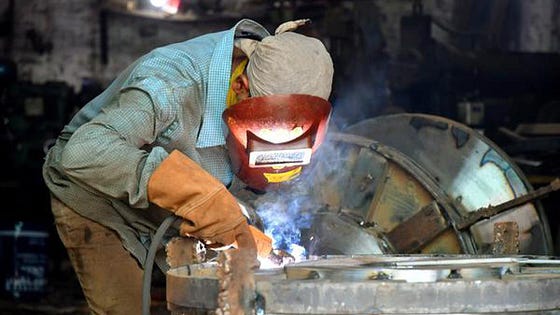Manufacturing sector eyes revised taxations, new PLIs

As Union Budget 2023 approaches, experts from the manufacturing sector, which contributes 15 per cent to India’s gross domestic product (GDP), are hoping for a reduction in import duties, and a revision in the taxation system, among other things from the government.
Here are some of the Budget expectations for the manufacturing sector.
Electric Vehicle industry:
As the Centre pushes for wider adoption of electric vehicles to meet the country’s decarbonisation goal, CEO of JLNPhenix Energy, Sunil Gandhi told Business Standard that reduction in import duty on the raw material of lithium-ion battery is what the manufacturers of the EV batteries hope for, along with a cut in the present GST rates.
Expecting big announcements for EVs, the Energy Storage System (ESS) and EV charging infrastructure, Gandhi said, “Reduction of imports duty especially on the parts used in the lithium-ion batteries can also be presented in the upcoming budget. There is a need to relook at the GST rate for Lithium-Ion batteries and reduce it from the current rate of 18 per cent and match it with the GST rate applicable on EVs i.e., 5 per cent.”
To meet the vision 2030 planned by NITI Ayog, Gandhi said that the government shall put a thrust on developing home-grown industrial units of Li-Ion cell manufacturing, BMS R&D and mass manufacturing, EV Motors and motor controllers.
In addition to FAME II subsidies and new quality standards, JLNPhenix Energy’s CEO said EV battery makers are also looking forward to ways to invest in improving supply chains and raw material costs.
His CEO and co-founder of Runaya, Naivedya Agarwal, has proposed expanding the Space Sector’s Production Related Incentives (PLI) program to domestically produce aluminum powders and to promote the rare earth and magnet manufacturing industries.”In the Federal Budget 2023–24 I would like to call for an extension of existing terms for new and start-up companies. In addition, the PLI program for the space sector for domestic production of aluminum powder will be expanded. This will encourage local production and facilitate domestic capacity development,” said Agarwal.
India holds 6% of the world’s rare earth reserves, Mr Agarwal noted, while the country produces only 1% of global production and gets most of its needs from China. said there is.
“We have the scale, capacity and ability to not only support requirements locally, but also export globally. A PLI program for the rare earth and magnet manufacturing industry is expected this year. We expect clear fiscal policies this year and a rare earth PLI program to boost EV production in India,” he added.
The government has announced that it will give incentives of at least $3.4 billion to domestic manufacturing of batteries, the most expensive component of electric vehicles.
According to recent reports, India is looking at ways to secure supplies of metals such as copper and lithium from the world’s top producers by acquiring overseas mines, bringing copper and lithium to resource-rich Argentina. Confirmed that there are two mines of lithium. You can buy it over time or secure a long-term lease.
Manufacturing Employment:
The key to economic growth is a skilled ‘labor force’, said Subramanya Ullal, CEO of SASMOS HET Technologies Limited. We do extensive hiring and training of young people. “As in previous years, the government should continue to focus on training qualified professionals,” he said.
Ullal said that while the ease of paperwork, registration, tax incentives, ease of financing and government subsidies have served the industry very well, to reap the benefits of the program it takes more. I added that a lot needs to be done.
“Most government procurement, at least as seen in the aerospace and defense industry, is driven by L1 processes, which most companies provide with superior quality and heavily invested manpower. Our request to the government is to address this issue and open opportunities for MSMEs to provide quality products,” he said.
ASSOCHAM said the coalition’s 2023–24 budget is likely to focus on job creation through programs like his PLI across 13 different manufacturing sectors. Investments of around Rs 50,000 crore have already been committed.
“The PLI program aims to inspire global companies to build manufacturing bases in India using the China Plus policy. The concept has been implemented and platforms such as the G20 are being used. This idea will also be reflected in the budget,” said ASSOCHAM’s Sood.
Originally published at https://businessdor.com on January 25, 2023.

Comments
Post a Comment